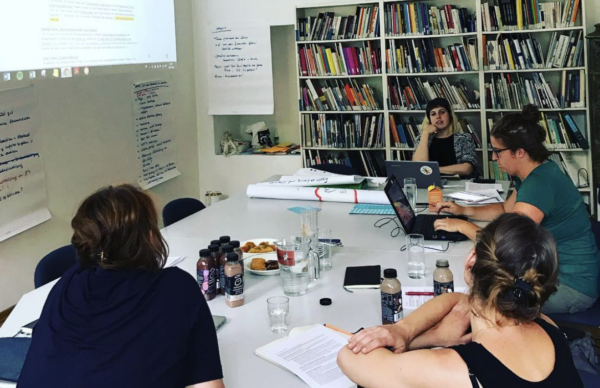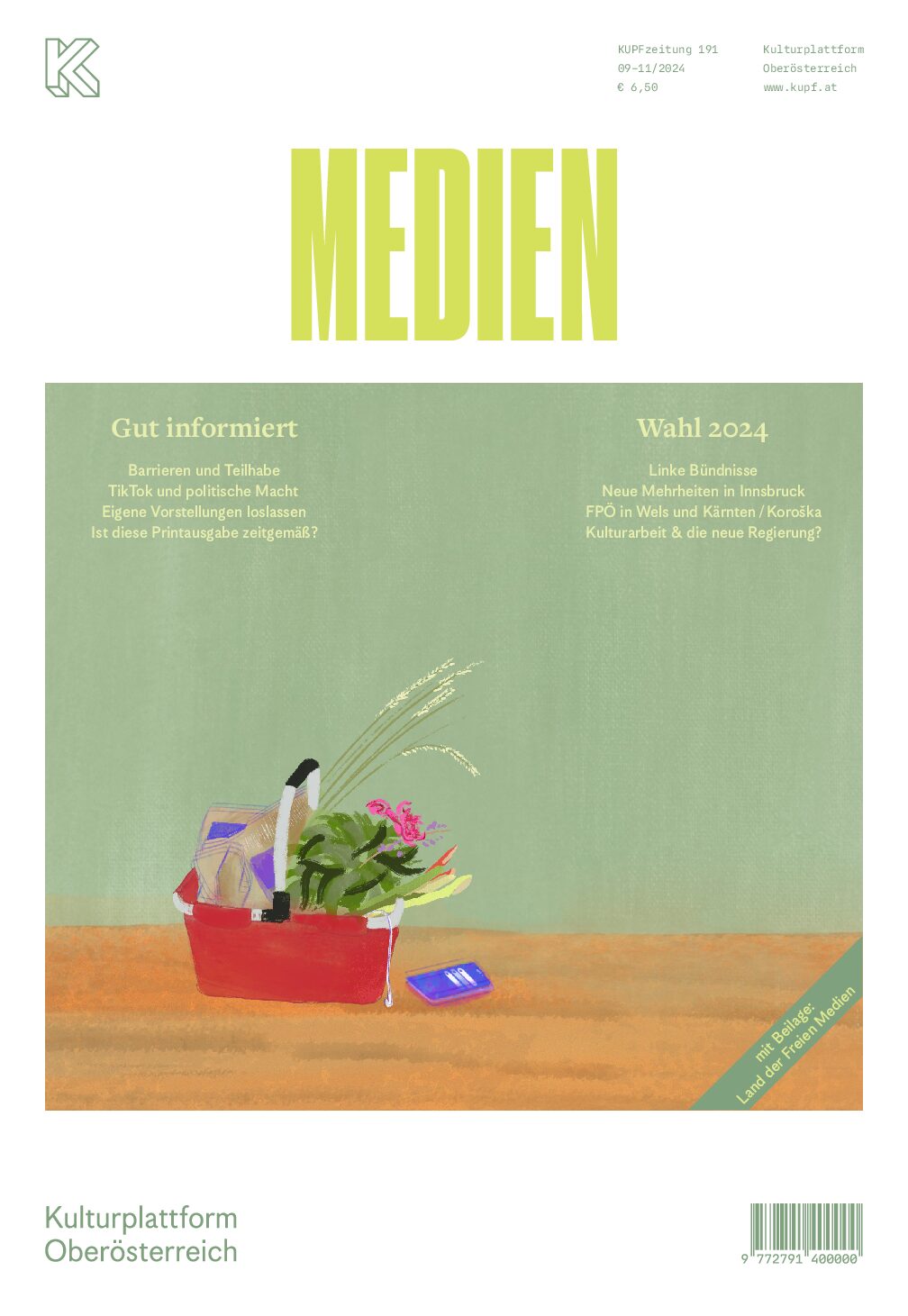To a certain extent, we are all illiterate. The number of people who can read and write well is declining, and our understanding of the world is shrinking as well. As the British media scientist Marcus Gilroy-Ware has analysed in his current book, „After The Fact,“ the causes of the current crisis of democracy are to be located in market-driven politics and society, both of which are responsible for withholding precisely this elementary knowledge. Why should capitalism be interested that we understand how it works? Christa Hager spoke to Gilroy-Ware about the characteristics of market-driven society and culture.
[You can find a shorter version of this interview translated into German here.]
Christa Hager: Instead of the term neoliberalism you have decided on using the term „market-driven society“. Why?
Marcus Gilroy-Ware: There are a lot of different texts about neoliberalism and there is a lot of flexibility and variation in what neoliberalism really means. Sometimes the term is used to bring market-like policies into the functioning of the state, sometimes it is the bringing of market logic into our social or professional relations, and sometimes it is the way we speak about life. That being the case, I felt we needed a term that is more precise than neoliberalism for what I wanted to talk about; a term that would not encompass all of these different understandings. The political economist Colin Leys introduced the term “market-driven politics” in his 2003 book of the same name to talk about how the British state had been reconfigured and privatised from the 1970s onwards, and I felt that this term had a clear, obvious and accessible meaning. In Britain we call this “exactly what it says on the tin”, after a brand of products that was marked for its plain simplicity. That’s what “market-driven politics” does in Leys’ work and I felt that a similar approach could be deployed for talking about the overall captive status of society and culture in market logics, as a result of neoliberalism, so I used “market-driven society”.
You quote Mark Fisher saying that “neoliberalism has sought to eliminate the very category of value in the ethical sense”. How is culture affected by neoliberal processes?
Like the democratic state, I and many others feel that culture (at least in Britain) has been taken over by market-driven thinking, often without people realising it. In fact, I would say our whole consciousness is conditioned by a culture where everything is implicitly guided by logics of commodification, exchange and competition. My feeling is that people are finding it increasingly difficult to cope with this state of affairs, but also to see and meaningfully reclaim value in the world outside of this logic, such as friendship, solidarity, health, true love, the environment, or the truth.
Fisher’s quote is very helpful when speaking about market-driven society, precisely because it entails a reduction or narrowing in what kinds of value people are able to recognise; the ‚anchors‘ that people rely on to orient themselves in the world. Can we live solely according to money, to competition, to exchange? And as far as ‚fake news‘, that is one of the other outcomes of a market-driven society: reason and truth are also under attack because for so long the ‚price‘ of being wrong was extremely ‚cheap‘.
What is being recognised through the pandemic, through the environmental crisis, through the misinformation and disinformation that accompany both, and through other pathologies that accompany this market-driven thinking is that we ignore these other forms of value at our peril. To use a market metaphor: this myopia is a luxury that we can no longer afford.
Does capitalism as a culture have a history that stretches back further than the neoliberal era?
Absolutely! Long before Thatcher and Reagan came along, during the Cold War, capitalism was already trying to prove it was the best, the freest, the most exciting; that communism was bad – and it had to work quite hard to succeed. So this took place via a lot of cultural innovations, and this ensured it was mainstreamed at the cultural level. Think for example about the objects that were created in that time: cars, airplanes, colour TVs, new musical instruments and sounds, new kinds of art, music and architecture. There was a certain language of arrogant western capitalist modernity. Electric guitars had the same paint on them that were used for cars, which were another big part of this wave of modernity.
Actually, it was the fascist governments who pioneered in linking a political system with culture. Fascism wanted to make its leaders seem big and important with modern technology and smart uniforms. And capitalism learnt to legitimise and aggrandise itself by cultural means as well, even if that culture didn’t become market-driven quite so comprehensively until later.
You also refer to culture industry to show how power has been able to achieve this ideological consensus, but isn’t that a bit pessimistic, depriving culture of its potential for resistance?
I do not think that being honest about the role of mass culture in bringing about state of the world. Nor am I the first person to say this – it is really associated with Adorno and Horkheimer, or possibly Chomsky and Herman. I just wanted to offer a reminder, and an introduction for people new to this idea. In terms of what has happened in recent years, you can not rely on plain rational self-interest to find explanations as to why people have collectively behaved (or voted) in the harmful, self-detrimental ways they have. So where do you go? You go to psychology and you go to the link between established forms of power and culture – what me might call ideology, in a proper sense. If it is not coming from culture, from ideology in this sense, in conjunction with the vulnerabilities in human psychology, where is it coming from? It has to be ideas, ruling ideas, that are doing that work. So it isn’t pessimistic to analyse and describe this – we must face with sober senses the situation in which we find ourselves, and actually I think this stuff also reveals the possibility for that cultural resistance, if the right moves are made.
So you don’t believe the possibility of culture for resistance is already lost?
Mark Fisher and many others have already wrestled with the difficulty of cultural resistance when people are so conditioned to be unable to think outside of the market-driven society. His approach is quite interesting because he looks at gangster rap and grunge as sort of the last forms of resistance in the 1990s before resistance itself was commodified, and also at Disney movies with villains who are also corporate CEOs, which may lead people to think: “Yeah, we’ve won the battle of representation! Finally the bad guy is being a corporate CEO!”, but does this actually do anything ? Arguably not. So cultural resistance isn’t as simple as that anymore. We’ve already know for decades that you don’t simply inject ideas into people’s heads, but maybe other more subtle forms of propaganda are losing their effect too, because we are so saturated with ideology, and people tend to just believe what they want. I think improvements to education are a very important part of what we need to do next. We will have to work hard and go beyond mere representation and spectacle. It’s a very slow process to be able to push the needle.
You refer to literacy as a broader understanding of the world and how to interpret it, as well as the ability to read and write. Nowadays, you argue, we are confronted with a massive lack thereof.
Sadly, yes. Literacy in the context of reading and writing has declined as standards of education have declined. But the broader sense of literacy is linked to understanding and being able to think actively and structurally about the world; to see the world in motion; to be able to think around corners, so to speak. True literacy is not just reading a text, it is about having deep knowledge of the that text. The same is true in terms of information about our world.
Literacy is a part of how people respond the information that they do encounter. When people are hungry and you offer them food, they gratefully receive the food and eat it. But when people are cynical, illiterate in this sense, but searching for answers and you offer them knowledge, the same thing does not hold. One way to see this play out is with the current discussion around freedom of speech. John Stuart Mill and Harriet Taylor Mill argued that if we allowed all ideas to be expressed, the public would be able to choose which is the best. But that relies on certain societal conditions, like the levels of education and literacy in the sense I’ve described. But the market-driven society has hollowed these out.
This is not a way of attacking individuals. We all need to develop collectivism shared knowledge about the world we live in. But that means collectively valuing that knowledge and understanding of the world, and making opportunities and incentives for everybody to cultivate it. And this has been eroded as well.
You focus on written language and reading. What about oral traditions or images? Can you imagine also other means by which people try to make sense of what is going on, like comics for example?
I was not consciously aware of this focus when I wrote the book, although I do refer to a lot of texts. But where do you draw the line between texts and oral culture? Take examples from rap or poetry: are these texts? Do certain kinds of subaltern traditions become alienated from oral culture just because they are written down? I’m not so sure!
But yes, of course – comic books, films, cartoons and of course memes and social media for younger generations definitely have potential for what we could call counterhegemony. And much as I’m a vocal critic of the digital platforms where these things are shared and the extremely aggressive, invasive forms of capitalism that they represent, I have always been a defender of the organic, bottom-up participatory culture that people produce on there. Like many people in the first lockdown in early 2020, I made a TikTok account, and I was pleasantly surprised by the witty, cosmopolitan, politically radical content that I saw being made there by quite young producers. It’s not all that great but it was way better than Facebook, Instagram or Youtube.
Speaking of representation: Is gender in language still an issue in the UK?
As I don’t really experience sexism as a man, it is hard to say first-hand. When I teach media law and read old laws for example, the language for talking about individual people is always male and I always wince slightly, whereas when you read newer laws, they seem to be more carefully drafted to avoid gendering the people they legislate about. I think at least there seems to be more awareness of the need to put women on an equal footing with men, and in fact to emancipate people from gender constraints, especially with regard to professional and legal matters, but I’d say it seems like there’s still a long way to go in general.
Do you have this bias in mind when you write?
Yes. When I am writing about unnamed persons, for example in hypothetical or fictive contexts, I sometimes use the female, sometimes use the male pronouns. And sometimes I try to confuse the gendered stereotypes, so for example when I’m talking about someone with a technical profession, thinking about the traditional exclusion of women from STEM subjects, I quietly use “she”. And I think that there are a number of people who are trying to do this as a conscious choice.
Surprisingly, in your book gender is mentioned in a very different context, namely in that of conspiracy theories.
I do not think that conspiracy theories are gendered. Lots of women are believers in conspiracy theories like that of anti-vaccination for example. I would say it seems to be more or less 50:50. But there is still this certain behaviour of men which Rebecca Solnit has described in her brilliant essay “Men explain things to Me” in which she describes this very male way of confidently relaying total and utter bullshit, while presuming the woman or women listening to be ignorant on the topic in question. This sounded like a good description of most of the male conspiracy theorists I’ve ever heard speak. So it may be that although conspiracism is not really gendered, the ways that it spreads can be gendered. There’s a question for someone to research!
Marcus Gilroy-Ware is a writer, researcher and teacher who works at the intersection of politics, culture and communication. He is also the author of “Filling the Void: Emotion, Capitalism and Social Media (Repeater 2017). http://www.mjgw.net



























































